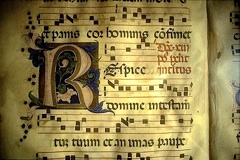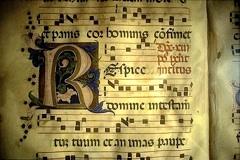
If vocal chant is the most pure, devotional form of music (as was thought in the Middle Ages), then Anonymous 4 is its guardian angel. This female group of four a cappella singers has done much to preserve and expose this form of music through live performance and more than 20 recordings, even offering “Chant Camp” for those who want a deeper experience. The group performs its new program, “Secret Voices: Music From Las Huelgas, ca. 1300,” at Stanford Lively Arts on Oct. 21; Chant Camp is Oct. 19.
Based in New York, Anonymous 4 consists of Marsha Genensky, Susan Hellauer, Jacqueline Horner-Kwiatek, and Ruth Cunningham. California native Genensky, originally a traditional folksinger, resides in Menlo Park and has been a visiting assistant professor at Stanford University. The group is known for its unearthly tonal blend and technical virtuosity, and possesses the necessary historical scholarship required for bringing this fascinating music to life. It has been a frequent guest at major festivals worldwide, has been featured on radio and TV programs such as A Prairie Home Companion and NPR’s Weekend Edition, and has sold some two million records on the Harmonia Mundi label.
Its new program comprises music from the Codex Las Huelgas, an extensive collection of polyphonic and monophonic music from the 13th and early 14th centuries. A listener coming for the first time to this music should realize that the education of women in that era was limited. Few were taught Latin or singing, or were even allowed to take part in worship, with the exception of women entering certain convents. Depending on the establishment, religious women were more or less simply given the skills and freedom to perform the Divine Office and to sing plainchant. Las Huelgas, or “the refuge,” was a Spanish nunnery founded for women of noble birth who wanted to pursue a spiritual life. Yet their strict Cistercian order forbade the singing of polyphony in most convents.

The “Secret Voices” program is structured like a day of music devoted to the Virgin Mary, including a few songs with texts dealing with the daily lives of the nuns themselves. Among the pieces are elegant French love motets like Claustrum pudicicie/Virgo viget/Flos Filius, about pastoral love in the springtime. There are conductus with unpredictable rhythms and lively hockets. A playful Benedicamus Domino à 3 is written in rondellus fashion, like a catch or round typical of 13th-century British polyphony. Also to be sung are heartfelt laments, like the monophonic song O monialis conscio, written on the death of a beloved member of the sisterhood, and elegant duos with intertwining lines, like the sequences Verbum bonum et suave and In virgulto gracie.
But how, you might wonder, was this music notated? And exactly what is a “psalm tone”? And can plainchant really feel like a religious experience? For those who want to learn more and try this music first-hand, Anonymous 4 and Stanford Professors William Mahrt and Jesse Rodin will lead an evening “Chant Camp” on Monday, Oct. 19. For the curious and the aficionado alike, “Secret Voices” will provide a tantalizing glimpse into medieval history and the heart of the Western spiritual tradition, and sounds simply divine.
If you go:
Tickets for Anonymous 4’s “Secret Voices,” presented by Stanford Lively Arts on Wednesday, October 21 at 8:00 p.m. at Memorial Church, are $40 for adults and $10 for Stanford students. Half-price tickets are available for young people age 18 and under and discounts are available for groups and non-Stanford students. For tickets and more information, call 650-725-ARTS (2787), or visit http://livelyarts.stanford.edu.
Tickets for Chant Camp on Monday, October 19 at 5:00 p.m. at Memorial Church are $10 for Anonymous 4 ticket holders and $20 for Chant Camp only. For reservations, call the Stanford Tickets Office at 650-725-ARTS (2787). Enrollment deadline is Friday, October 16.

